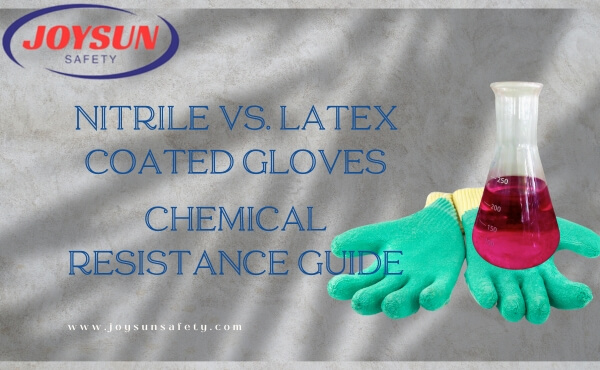Chemical resistance plays a crucial role in selecting the right protective gloves for various applications. Nitrile coated and latex coated gloves are two popular options, each offering distinct advantages. Nitrile coated gloves, made from synthetic rubber, provide superior protection against a wide range of chemicals. Latex coated gloves, made from natural rubber, offer excellent comfort and dexterity. This blog aims to compare the chemical resistance of nitrile and latex coated gloves to help users make informed decisions.
Features and Benefits of Nitrile Coated Gloves
Material Composition
Nitrile coated gloves use synthetic rubber, which offers several advantages. This material provides excellent chemical resistance to a wide range of substances. Synthetic rubber does not cause allergic reactions, making it suitable for individuals with latex allergies.
Durability and Strength
The durability and strength of nitrile coated gloves make them ideal for demanding tasks. These gloves resist cuts, abrasions, and punctures. The thicker coating enhances protection against stronger chemicals and physical hazards. Industries such as manufacturing, automotive, and construction benefit from the robust nature of these gloves.
Chemical Resistance
Nitrile coated gloves excel in resisting common chemicals. They provide a barrier against oils, greases, and various solvents. These gloves also withstand exposure to alcohols, caustics, and organic acids. This makes them highly versatile for different applications.
In industrial settings, nitrile coated gloves offer superior chemical resistance. Workers in manufacturing, painting, and general assembly rely on these gloves for protection. The gloves maintain their integrity even when exposed to harsh substances. This ensures safety and efficiency in the workplace.
Additional Benefits
Nitrile coated gloves possess hypoallergenic properties. Unlike latex coated gloves, they do not trigger allergic reactions. This makes them a safer choice for individuals with sensitive skin or latex allergies.
The puncture resistance of nitrile coated gloves adds an extra layer of safety. These gloves protect hands from sharp objects and potential injuries. This feature is particularly valuable in environments where precision handling is required.
Features and Benefits of Latex Coated Gloves
Material Composition
Latex coated gloves use natural rubber, a material known for its elasticity and comfort. Natural rubber provides a snug fit, which enhances the glove’s ability to conform to the hand’s shape.
Elasticity and Comfort
The elasticity of latex coated gloves offers a high level of comfort. The gloves feel like a second skin, providing an excellent sense of touch. This feature is particularly advantageous for medical professionals who need to perform delicate procedures. The gloves also maintain their flexibility over extended periods of wear, ensuring consistent performance.
Chemical Resistance
Latex coated gloves provide reliable chemical resistance against various substances. The gloves effectively protect against mild acids, alkalis, and alcohols. This makes them suitable for general usage in environments where exposure to these chemicals occurs.
In medical settings, latex coated gloves excel due to their combination of comfort and chemical resistance. Healthcare workers rely on these gloves for protection during examinations and surgical procedures. The gloves’ ability to resist common chemicals found in medical environments ensures both safety and hygiene.
Additional Benefits
The biodegradability of latex coated gloves presents an environmental advantage. Unlike synthetic materials, natural rubber decomposes more easily. This reduces the environmental impact of disposable gloves, making latex coated gloves a more sustainable option.
Direct Comparison of Chemical Resistance
Comparative Analysis
Nitrile coatings exhibit superior chemical resistance to acids compared to latex coatings. Nitrile’s synthetic rubber composition offers a robust barrier against a variety of acidic substances. This makes nitrile coated gloves ideal for tasks involving strong acids like sulfuric acid or hydrochloric acid. In contrast, latex coated gloves provide limited protection against acids and may degrade quickly when exposed to strong acidic environments.
Nitrile outperforms latex in resisting solvents. Nitrile’s synthetic material withstands exposure to organic solvents such as acetone, benzene, and toluene. This high level of chemical resistance ensures that nitrile coated gloves maintain their integrity in industrial settings where solvent use is common. Latex, on the other hand, does not offer adequate protection against most solvents. The natural rubber in latex coatings can break down when in contact with harsh solvents, compromising safety.
Data and Examples
In real-world applications, the chemical resistance of nitrile coated gloves proves invaluable. Workers in automotive and manufacturing industries prefer nitrile coated gloves for handling oils, greases, and solvents. These gloves provide reliable protection, ensuring worker safety and productivity. In contrast, healthcare professionals often choose latex coated gloves for tasks where comfort and a secure grip are prioritized but avoid them for procedures involving strong chemicals. The choice between nitrile coated and latex coated gloves depends on the specific chemical exposure and required protection level.
Recommendations Based on Comparison
Best Use Cases for Nitrile Coated Gloves
Nitrile coated gloves excel in industrial and laboratory settings due to their superior chemical resistance and durability. Workers in manufacturing and automotive industries benefit from the gloves’ ability to withstand oils, greases, and solvents. The synthetic rubber composition of nitrile provides a robust barrier against a variety of hazardous substances. This makes nitrile coated gloves ideal for tasks involving strong chemicals such as sulfuric acid or acetone.
Laboratory environments also favor nitrile coated gloves. The gloves offer three times more puncture and chemical resistance than latex coated gloves. This high level of protection ensures minimal cross-contamination and maintains safety during experiments. Nitrile coated gloves’ long shelf life and lower resistance to friction make them a practical choice for frequent glove changes.
Best Use Cases for Latex Coated Gloves
Latex coated gloves are highly suitable for medical and food handling settings. The natural rubber material provides excellent elasticity and comfort, making the gloves feel like a second skin. Healthcare professionals rely on latex coated gloves for tasks requiring a secure grip and comfort. Surgeons and nurses benefit from the enhanced grip and touch sensitivity, which are crucial for patient care.
In food handling environments, latex coated gloves offer reliable protection against mild acids, alkalis, and alcohols. The gloves’ snug fit ensures precision in tasks such as food preparation and packaging. The biodegradability of latex presents an environmental advantage, reducing the impact of disposable gloves on the environment. This makes latex coated gloves a more sustainable option for industries concerned with ecological footprint.
- Summary of Key Points
Nitrile coated gloves offer superior chemical resistance, durability, and hypoallergenic properties. Latex coated gloves provide excellent comfort, elasticity, and biodegradability. Nitrile resists a wider range of chemicals, including strong acids and solvents. Latex is well-suited for tasks where a secure grip and comfort are priorities.
- Final Recommendations Based on the Comparison
For industrial and laboratory settings, nitrile coated gloves provide the best protection. For medical and food handling environments, latex coated gloves offer optimal comfort and precision.
- Encouragement to Choose the Right Glove Based on Specific Needs
Selecting the appropriate glove depends on the specific application and required protection level. Consider the chemical exposure, comfort needs, and environmental impact when choosing between nitrile coated and latex coated gloves.


















